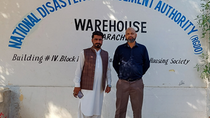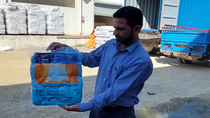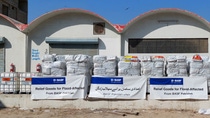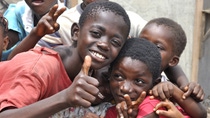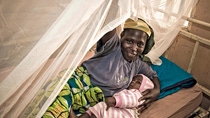Agriculture
Control tools donated against mosquitos and diseases outbreak in Pakistan after devastating floods
BASF donates vector-borne disease control tools for Pakistan
July 2022 brought a story of tragedy to Pakistan, with widespread flooding inundating vital farmland and other important infrastructural areas. Illness began to spread quickly as disease-carrying mosquitos bred in standing water left behind from the flooding. Tents were set up near the floodplains as makeshift homes, which provided little structural protection from the growing populations of mosquitos. Malaria and dengue fever took over in the communities. To prevent diseases and respond to outbreaks, mosquito control measures were needed immediately.
We knew it was time to act.
This is a devastating situation.
“With the indoor residual spray Fendona® and Interceptor® mosquito nets we have efficient and immediate solutions in our portfolio to help preventing any further sickness or losing any more lives to vector-borne diseases,” remembers Saima when reading their plea.
Within a short time, the Pakistan team together with regional and global teams donated over 3,000 liters of Fendona® insecticide and around 23,000 Interceptor® mosquito nets to the National Disaster Management Authority (NDMA). This quick response was possbile as a registration was not required, whereas the necessary No Objection Certificates (NOC) were approved by the relevant authorities.
Stewardship at work – even in times of crisis
Coordinated by the NDMA, the Interceptor mosquito nets and the Fendona sprays were distributed to multiple large cities in the Sindh province, an area that has suffered some of the worst damage according to UN. “Beyond donation of the mosquito control measures, part of our Stewardship commitment is that we ensure the proper and safe usage of our products. Making sure that the distributing authorities also had the complete education material for the safe use of the tools was essential.”
As Saima contemplates the current situation, it's evident that these disastrous effects will linger for some time to come. Countless families remain in temporary housing and with elevated risk of vector-borne diseases after the flooding. Children are an especially vulnerable part of the population, where the effects of mosquito borne illnesses result in much more severe and long-term symptoms than a common cold. The prolonged illness also leads to absence from school and gaps in education. Saima continues to emphasize the importance of immediate and continued access to insect-control technologies: “Therefore, getting children back in school and safe from disease-carrying mosquitos is a critical task in this area.”
Vector-borne diseases are a serious threat in areas that have been hit by natural disasters.
Visit BASF Public Health to learn more about how we are helping to prevent these diseases from spreading.
